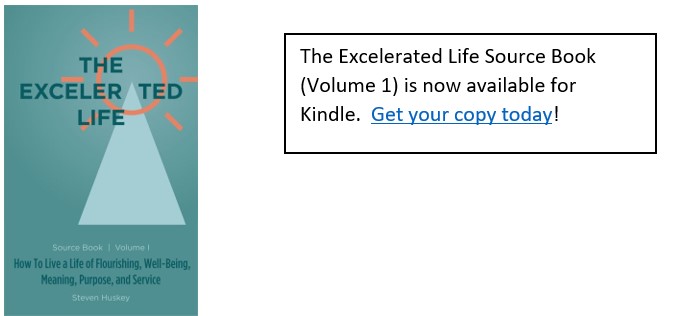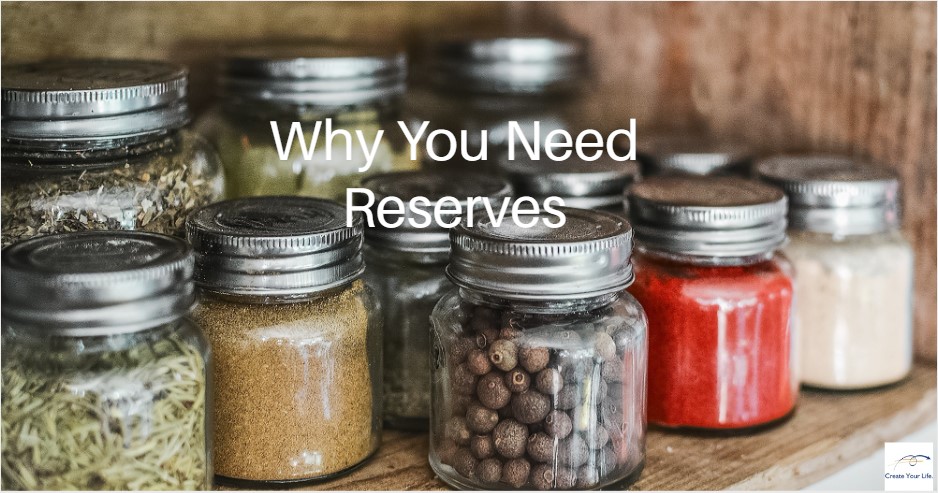Having a reserve is the feeling of having enough and building a reserve is an integrated process that strengthens your foundation. Only you can decide in what areas and how much of a reserve you must have to feel a need is met. Begin to follow the Excelerated Reserves™ practice to build your reserves.
Why You Need Reserves – A Pre-Pandemic Story
I have a group of cousins who get together a couple of times a year, sometimes at the beach, sometimes in the mountains. In early March of 2020, we were visiting Damascus, VA. We stayed in a lovely old inn, which we had to ourselves. Occasionally, we’d have the TV playing in the background and, even less frequently, we’d see a story about the COVID infection that had been spreading in China and had been discovered in a few places in the US. We had other things to talk about and to do and no one paid much attention to the news.
However, over that weekend, much of the rest of the country headed into lockdown mode. And while the stores in Damascus seemed to be pretty well-stocked, imagine my surprise when we visited our local grocery store after we returned home. Empty shelves abounded, particularly in the paper aisle. There was no toilet paper, no paper towels, and no other paper products anywhere to be found.
Fortunately, I have been following the practice of Excelerated Reserves™ for some years now. So we had ample reserves of toilet paper, paper towels, tissues, and other basic supplies. You’ll learn more about the particulars of Excelerated Reserves™ later in this post if this is a new concept, but I hope many of you are already familiar and have been practicing it yourself. It allowed us to navigate the pandemic without worrying about running out of basic essentials.

Why You Need Reserves
One way to understand the need for having a reserve is to look at Maslow’s Hierarchy of Needs. Excelerated Reserves™ — moving from a scarcity mindset to an abundance mindset — helps you to progress up the hierarchy of needs toward self-actualization and transcendence. You must experience having enough at the lower levels of physical and emotional needs in order to move to the higher levels of the hierarchy.
Of course, advancing up the hierarchy isn’t a straight-line path; we move up and down among the various levels. But before we can become our best selves, we must get our basic physical and psychological needs taken care of. Not just enough but more than enough to keep our brains from going back and dwelling on a lack of resources in any area. Having a reserve calms that fear and allows us to focus on higher goals.
And it comes in mighty handy when stores are empty of toilet paper!
Having a Reserve Is More Than Stockpiling Supplies
Having a reserve is more than simply stocking up on supplies, although that is part of the process. But a reserve is more . . . it is a feeling of having enough.
Building a reserve is an integrated process that strengthens your foundation. Stockpiling is an exercise in accumulation, which is a step toward building a reserve, but is not the reserve itself.
“You may need reserves to experience a reserve,” says Thomas Leonard, a pioneer of life coaching, “but reserves themselves are not enough.” [Leonard]
You need a reserve in many different areas – any part of your life where you are worried about not having enough. Here are a few. This is not an exhaustive list, but a way to get your own ideas flowing.
Why You Need a Cash Reserve
Cash reserves obviously keep you from worrying about running low on money. Here are a few areas to consider.
Have an emergency fund for financial emergencies or in case you were to lose your job. Aim for six to nine months’ worth of expenses. You can accumulate this over a period of time.
Have a plan and a fund for long-term expenses. These are expenses you know are going to occur sometime in the future but they are not monthly bills; for example, taxes, tires for your car, or insurance. Can you think of others?
Unexpected or unplanned expenses, that you encounter from time to time. For example, I keep “tip money” in my wallet to use when I need to leave a tip. I then replace it as I use it.
A critical need for cash reserves is in planning for retirement(!). Retirement is going to come to most of us whether we’re ready or not. Having ample retirement savings, perhaps augmented with social security, can make the difference between an enjoyable retirement or one fraught with financial worries. Even if you choose to continue working, a retirement fund gives you options. Otherwise, you may have to continue working as a necessity, not by choice.
Why You Need a Reserve of Supplies
A reserve of supplies covers the realm of toilet paper and a good deal more. Supplies run from household necessities, cosmetics and personal care items, to food staples, even hobby or other materials.
Keeping a reserve of supplies helps to fulfill some of the basic needs identified in Maslow’s hierarchy. You can think of this reserve as an “emergency fund”, not of money but of things you might require in a crisis, for example, if you lost power for an extended time. (Or if a pandemic emptied store shelves.)
Recall Thomas Leonard’s idea that “a reserve is a feeling”. When you have a reserve of supplies, you have no worries about running out. And when you follow the practice of Excelerated Reserves™, you begin to automate the task of keeping adequate supplies, giving you one less thing you have to think about.
Why You Need a Reserve of Time
Having a reserve of time provides you with the time to think and to be, not just to do. It puts a stop to the feeling of being rushed and to the act of rushing about (“like a chicken with its head cut off” in my southern dialect).
Building a reserve in this area helps you avoid “pathological productivity”, as Oliver Burkeman explains in Four Thousand Weeks. This is the feeling that we must be busy all the time, that we have no time to rest. We “get antsy when we feel as though we’re not being sufficiently productive.” [Burkeman]
Having an ample reserve of time gives you a chance to “stop and smell the roses”. More importantly, it provides you the space to think, a commodity that is becoming more and more scarce. You begin to see opportunities that you were “too busy” to notice before.
Why You Need a Reserve of Energy
Why is it a good idea to create reserves of energy?
Because . . .
energy = your life force.
energy = your ability to accomplish.
energy = the foundation upon which your life and accomplishments are constructed.
In considering energy reserves, remember these three types of energy.
Physical energy. This is the energy you use for moving about, digesting food and performing other bodily functions, and doing physical labor.
Emotional energy. This is the energy that sparks our enthusiasm and excitement. It is also the energy we nibble away at with worry and frustration. Almost everything we say and do carries some emotional impact, either positive or negative, and has an energy cost.
Mental energy. This is the energy we use in creativity, planning, problem-solving, and decision-making. Most mental activity is high leverage – a little effort can pay big dividends.
Why You Need a Reserve of Fun
We don’t often think of “fun” as an area where we need to have a reserve. Here’s why you do.
We need fun to keep life interesting. “All work and no play makes Jack and Jane a dull boy or girl” as the saying goes. And one way to increase “fun reserves” is to engage in atelic activities.
According to philosopher Kieran Setiyam, atelic activities are done for their own sake, not in order to achieve a particular end. [Burkeman] These include doing things such as taking a walk in the woods, reading for pleasure, or listening to music. (Note: most hobbies have an end result in mind, not bad but not atelic.)
When you conclude a task, or a chore, or a project, it’s done. When you achieve your current goal, it’s done, too. They might possibly be fun while you’re doing them, but once you’re done, it’s over. Atelic activites are never “done”. You might stop doing them for a while, but you don’t finish them. You can always go back to them or do them again. “We might seek to incorporate into our daily lives,” writes Oliver Burkeman in Four Thousand Weeks, “more things we do for their own sake alone – to spend some of our time, that is, on activities in which the only thing we’re trying to get from them is the doing itself.” [Burkeman] We do some things we enjoy simply for the joy of doing them. That’s building fun reserves.
Where Do I Begin?
Here are some ideas for building a reserve in each of the areas we’ve discussed: finances, supplies, time, energy, and fun. Pick one suggestion in each of these areas and make a plan of small steps you can take to begin building your reserves. Repeat until you have the reserves you need.

Building a Cash Reserve
(Please NOTE: I am neither a financial planner nor a licensed counselor. Before you make changes to any savings or investment plans, I urge you to seek the assistance of a qualified professional.)
- Keep $100 that you never spend. If necessary, start by putting aside $5 or $10 each week. Keep this in a safe place in your wallet or purse. NEVER touch it.
- Save 10% of your income. Pay yourself first by having this taken out of your income and automatically deposited in a savings account. If 10% seems too large, start with 1% and gradually increase your savings.
- Give away 10% of your income. Give to your church or to an organization that does work you consider important in the world. Give to whomever or whatever contributes to your own spiritual growth. Giving away part of your income establishes an abundance mentality. Again, if 10% seems too large, start small and work up.
- Have a “splurge” account. A large portion of the money you are saving should be for building an emergency fund and for retirement. But set aside a portion of your savings for fun – a vacation, a trip, a special set of golf clubs . . . things that contribute to your enjoyment of life now.
- Build an emergency cushion. One of the first things you should save for is to accumulate enough cash to cover three months of expenses. Once you have that, then continue adding until you have nine months of expenses covered. Knowing that you can take care of yourself and your family in the event of a job loss, a health issue, or another crisis brings peace of mind.
Building a Reserve of Supplies
- When you open the last, get a new one. This is a tip I learned from a friend who was an inventory manager in a large company. It works well for supplies and staple items. As soon as you open the last package or container of an item, put it on the shopping list.
- Have enough but don’t hoard. There is a line between having a reserve and hoarding and that line is different for each of us. The key is to have enough so that your brain isn’t constantly worried about running out and then stop stockpiling.
- Buy on sale. Years ago, I read a financial tip that said ‘Never pay full price for shaving cream.’ You know that you are going to need shaving cream, toilet paper, paper towels, soap, toothpaste, etc., etc. If you have a reserve of these, then you are free to watch for them to go on sale and buy them then. If you don’t have a reserve and run out of a necessary supply, then you have to pay full price to get it now.
- Keep a shopping list. Using a shopping list is necessary to help you with the preceding steps. It also removes the burden of your brain having to remember what you need and when you need it.
- Fill your gas tank when it reaches 1/2 full.
Building a Reserve of Time
- Arrive 10 minutes early to meetings and appointments. This gives you time to breathe and relax rather than rushing in at the last moment, breathless and harried.
- Keep some time free – don’t overschedule. Having a cushion of money for emergencies brings peace of mind. Having a cushion of time has the same benefits. Don’t try to cram so much into one day. Keep some breathing room.
- Take time off. Seneca said, “. . . constant effort will sap our mental vigor, while a short period of rest and relaxation will restore our powers. Unremitting effort leads to a kind of mental dullness and lethargy.”
- Delegate. This is probably one of the most powerful and most underused time management skills. Just because something must be done doesn’t mean you have to do it. Expand your capabilities by becoming excellent at delegating.
- Don’t do that which doesn’t need to be done. As Peter Drucker said, “There is nothing so useless as doing efficiently that which should not be done at all.”
Building a Reserve of Energy
Physical Energy
- Exercise at least 30 minutes per day at least 4 days a week.
- Eat for health and energy.
- Get adequate sleep, 7 – 9 hours depending on your individual needs.
- Avoid caffeine and refined sugar.
- Keep your home and work environments neat and uncluttered.
Emotional Energy
- Express emotions honestly and appropriately. Don’t let issues build up.
- Discuss problems and issues with the people who can address them.
- Discuss issues as soon as they arise. Don’t ignore or step over anything.
- Get your needs met.
- Set boundaries for yourself. Respect others’ boundaries and expect the same.
Mental Energy
- Practice daily prayer or meditation.
- Periodically engage in a hobby or some other pursuit that is completely different from your routine daily activities.
- Use an external method for tracking tasks and projects rather than trying to keep a mental to-do list.
- Never worry about things (and people) over which you have no control.
- Embrace the Serenity Prayer. (God, grant me the serenity to accept the things I cannot change; courage to change the things I can; and wisdom to know the difference.)
Building a Reserve of Fun
- Keep a list of new things to try and new places to visit. Aim to mark at least one item off the list each month.
- Make a list of 100 things you want to try, see, visit, taste, or do. Some people call this their “bucket list” (a name I don’t really care for). These can be big and small experiences you want to have before you “kick the bucket”.
- Schedule fun activities. Don’t leave having fun out of your schedule. Fun is too serious to be left to chance.
- Be a tourist in your home town. You don’t always have to travel to distant places for excitement or new experiences. Find local activities and places to visit and experience.
Practice, Practice
Only you can decide in what areas and how much of a reserve you must have to feel a need is met. We aren’t talking mindless accumulation but you want to have more than enough so that you can be freed from having to get the need met over and over.
Our culture tends to have us fixate on the lower levels of physiological and safety needs.
By setting up reserves in these areas, your mental, emotional, and creative resources are freed up and you can move up the hierarchy toward self-actualization.
Have you run out of gas recently, metaphorically speaking? Or toilet paper? Or patience? Or energy? Or compassion? Or . . . ? Where might you need to build a reserve? Begin to follow the Excelerated Reserves™ practice. That is one step in embracing your Excelerated Life™!
In what areas do you have sufficient reserves?
In what areas do you need to build a reserve?
Share your thoughts by leaving a comment below.
Excelerated Reserves™ — moving from scarcity to abundance — is one step in creating your Excelerated Life™, a life of flourishing and well-being, and a life of meaning, purpose, and service.
Read more about the Excelerated Life™.
Resources:
Burkeman, Oliver. Four Thousand Weeks: Time Management For Mortals. New York: Farrar, Straus and Giroux, 2021.
Leonard, Thomas. The 28 Laws Of Attraction. New York: Scribner, 1998.



One Reply to “Why You Need Reserves”